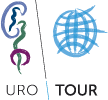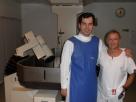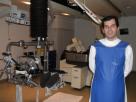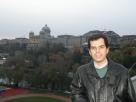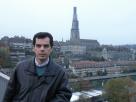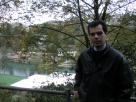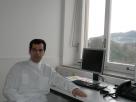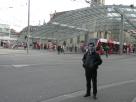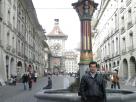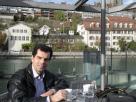Center of Excellence: Urologische Universitätklinik, Inselspital, Universitätspital Bern
City: Bern, Switzerland
Director: Prof. G. Thalmann
Visit Dates: 28th October - 4th November 2012
Trainees: Ιoannis Xoxakos (Athens)
Vasilis Sfiggas (Patra)
What the Trainees said
Description and Evaluation of the Center
Within the context of Urotour 2012, I had the opportunity to visit the Department of Urology of the University Hospital of Bern, during the period 28th October-4th November 2012. The Department is a Urology Center of Excellence, exemplary in its organization and operation.
The medical staff of the Center is composed of Professor G.Thalmann (Director), Professor U. Studer (Expert Consultant), Professor F. Burkhard (Vice Chairwoman), M. Spahn (Senior Consultant) and a number of Registrars and several Residents.
The Department is accommodated in a building that is independent from the rest of the University Hospital and expands on 3 floors with 45 beds and various departments. More specifically, it has the Extracorporeal Lithotripsy Unit with operation rooms for endoscopic and percutaneous procedures related to lithiasis, a fully equipped state-of-the art Urodynamics & Videourodynamics Unit, the Radiodiagnostic Unit (exclusively for the Urology Department), Ηigh Dependency Unit (HDU) for urological cases and, of course, the Outpatient Clinic. In the same builiding are located the operating theaters where only urological surgical procedures are performed covering though the entire spectrum of Urology (open, laparoscopic, endoscopic procedures), as well as the Robotic Unit.
The daily activity program of the Center, which we ourselves also followed as Visitor Physicians, included first the daily morning meeting of the Physicians of the Department and then attendance of surgical procedures -both open and endoscopic- that were simultaneously performed in all rooms, and other activities, such as Extracorporeal Lithotripsies, Urodynamic Studies, Cystoscopies, Outpatient Clinic visits etc. We were provided with our daily schedule the previous day, so we had the potential to choose the procedure we would like to attend. We were always welcome to all Units and the colleagues were kind and willing to explain and answer our questions. Later on, there was the afternoon meeting of the Department, with the participation of the Uro-radiologists of the Clinic, as well. During this meeting there was discussion about patients who had been operated during that day and also patients who were scheduled to be operated the next day.
In addition, twice a week, after the afternoon meeting, there would follow a presentation of some Urological topic by a Urologist of the Department, within the Residents' educational/training context.
Both operating theaters and the other facilities of the Center were state-of-the art and fully equipped. I was particularly impressed by the organization and management of the patients' data base and working protocols concerning every scientific activity.
As a conclusion, I believe that visiting the Urology Department of the University Hospital in Bern offers a unique experience to broaden the knowledge on all fields of Modern Urology and to get acquainted with the operating system which constitutes a model providing high-level scientific and research work.
Description and Evaluation of the Center
The Department of Urology of the University Inselspital of Bern was founded in 1941 and is today worldwide renowned both for its clinical and research work. It is directed by Professor Prof. G Thalmann and staffed by a great number of Specialized Physicians and Residents, who are activated covering the entire spectrum of Urology. The Department is hosted in a building that is separate from the rest of the Hospital and is called 'Anna Seiler - Haus'. Expanding on 3-5 floors, it comprises the patient wards (45 beds), 2 operating theaters (with open or robotic surgical procedures performed daily), the Extracorporeal Lithotripsy Unit (on the basement with an extra operation room and an Anesthesiologist for endoscopic procedures, such as ureterolithotripsies, percutaneous renolithotripsies and placement of nephrostomies and pig-tails) and Regular Clinics on the 2nd floor covering the whole range of urological diseases (e.g. lithiasis, neurourological conditions, incontinence, urinary tract infections, cases of Oncology, Andrology, Infertility etc.). On the floor with the operation rooms, there is a room operating daily for transurethral procedures, the Urodynamic Unit (where urodynamic and videodynamic studies are conducted) and the High Dependency Unit (HDU).
With regard to the daily program of the Department, there is an initial morning briefing at 7:40 and there is another meeting at 16:00 to discuss about the surgeries of that day and the ones scheduled for the following day, to set diagnostic or therapeutic problems that might have potentially emerged either in patients hospitalized in the Department or other patients. This afternoon meeting is also a Uro-Radiological meeting, for the Radiologist is there on a daily basis. Once a week -on a different day every week- there are visits to the patient wards, endoclinical courses and a meeting with Oncologists.
The Clinic has also to present rich research work with the participation of its staff members in a great number of research protocols and clinical studies resulting in many papers and published articles. I believe that coming in contact with eminent and worldwide distinguished Urologists -even if for a short time- is highly beneficial. Visiting a Hospital that operates within a well-organized health system without the known inflexibilities and pathogeneses, having the opportunity to attend and participate in specialized surgical procedures that we never or rarely see in our country and getting acquainted and exchanging viewpoints with young foreign colleagues are only some of the many benefits I have gained from this experience. That is the reason why I would strongly encourage other young Urologists to participate in the Urotour Program.

